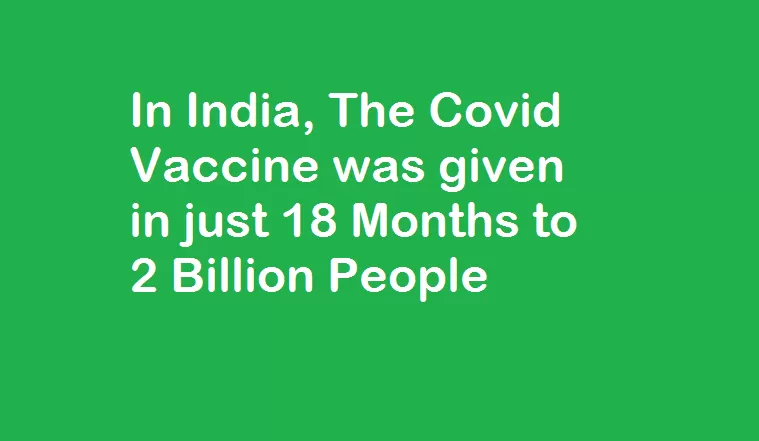Hindustan has recently reported that India’s successful vaccination campaign against the COVID-19 virus has been hailed as an exemplary effort by many experts. The country achieved this feat in 18 months, making it one of the fastest vaccination drives globally. India’s vaccination drive began on January 16, 2021, and over two billion doses have been administered since then.
The Indian government adopted a multi-pronged approach to ensure the vaccine reached every nook and corner of the country. This proactive approach included leveraging technology to track vaccine shipments, conducting door-to-door campaigns for remote areas and vulnerable populations, and setting up massive city vaccination centers.
The success of India’s vaccination campaign can also be attributed to its robust healthcare system and well-trained healthcare workers who worked tirelessly in challenging conditions. Despite initial challenges, such as vaccine hesitancy and misinformation campaigns on social media platforms, India managed to vaccinate its population quickly and efficiently. In conclusion, the successful rollout of India’s vaccination campaign is a testament to its resolve to fight the pandemic with coordinated efforts from government agencies, healthcare workers, volunteers, and citizens.
The scale of the challenge
The scale of the challenge in providing the covid vaccine to 2 billion people in India cannot be overstated. This unprecedented feat required tremendous resources, planning, and coordination at every level. To put things into perspective, India’s population is roughly four times that of the United States, which has administered around 330 million doses.
CNBS reported that to achieve this monumental task, Indian authorities had to navigate various challenges, including infrastructural deficiencies, logistical complexities, and vaccine hesitancy among certain sections of society. The vaccination drive involved setting up tens of thousands of nationwide sites where people could get vaccinated. Furthermore, vaccines had to be transported across vast distances and kept at optimal temperatures throughout transit.
Despite these difficulties, India managed to vaccinate millions daily by leveraging its existing healthcare infrastructure and deploying innovative solutions such as mobile vaccination units to reach remote areas. While there is still much work left to ensure equitable access for all citizens, India’s success in vaccinating such a large number within a short time frame is a testament to what can be achieved with determination and collaboration.
Innovative strategies for distribution
One innovative strategy for distributing the covid vaccine in India was utilizing mobile vans fully equipped with medical supplies and personnel to reach remote areas. This helped ensure that even the most hard-to-reach communities received their vaccines. Additionally, the Indian government collaborated with private companies to ramp up the production and distribution of the vaccine. By partnering with corporations like Tata Group and Bharat Biotech, they were able to increase their manufacturing capacity and speed up the delivery of vaccines.
Another strategy used in India was creating a comprehensive digital vaccine registration and tracking platform. The CoWIN platform allowed individuals to register for vaccinations online or through a mobile app, reducing long wait times at vaccination centers. The platform also tracked vaccine inventory and stock levels, allowing officials to make informed decisions about where to allocate resources based on demand. These innovative strategies played an important role in ensuring that India could vaccinate such a large population within 18 months despite initial challenges around supply chain logistics and shortages of medical personnel.
rajkotupdates.news:covid-vaccine-record-india-2-billion-doses-of-covid-vaccine-in-just-18-months
Overcoming vaccine hesitancy
Despite the successful rollout of the Covid-19 vaccine in India, some still remain hesitant about getting vaccinated. This hesitancy can stem from various reasons, such as misinformation, fear of side effects, or distrust in government and pharmaceutical companies. Overcoming vaccine hesitancy is crucial in achieving herd immunity and ending the pandemic.
One way to overcome vaccine hesitancy is through education and awareness campaigns. Providing accurate information about the efficacy and safety of vaccines can help dispel myths and alleviate fears. It is also important to address concerns about side effects by highlighting that they are generally mild and short-lived compared to the severe consequences of contracting Covid-19.
Another approach could be increasing access to vaccines, particularly for marginalized communities facing barriers such as lack of transportation or language barriers. Setting up vaccination sites in easily accessible locations such as community centers, religious institutions, or schools can help increase uptake among those without easy access. Addressing vaccine hesitancy will require a multifaceted approach, but we must all play our part in ending this pandemic.
Read Also: rajkotupdates.news:indias-first-5g-call-by-ashwini-vaishnav
